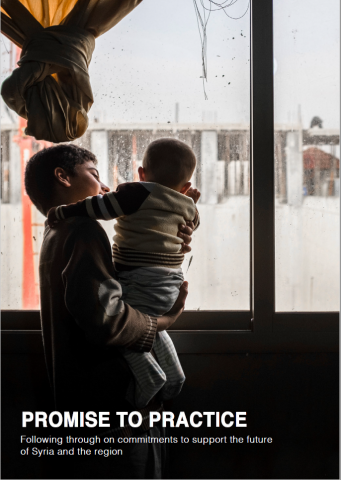New report on Syrian refugees highlights durable solutions to our generation’s largest displacement crisis
The Promise to Practice report gives recommendations on how to follow through on international commitments to support the future of Syria and the region ahead of the Brussels conference in late April. The report is signed by 39 agencies, including Finn Church Aid.
The conflict in Syria has created the largest displacement crisis in well over a generation, possibly since the second world war. Six million people remain displaced internally, more than five million are registered as refugees in neighbouring countries and over a million more have fled to Europe or elsewhere.
Despite a moderate increase in return of mostly internally displaced people in 2017, the last year saw three newly displaced Syrians for every person who returned home. The recent escalations of violence in Idlib and Eastern Ghouta dramatically underline the point that Syria’s conflict, and the ordeal for its civilians, is far from over.
The international community has made significant financial and political commitments to address the massive scale of this crisis, in particular through two major conferences, held in London in 2016, and Brussels in 2017. A follow up conference will be held in Brussels on 24-25 April 2018.
Last year’s Brussels conference saw pledges of US$6 billion, and a further US$3.7 billion for 2018-2020. This funding has meant millions of people inside Syria can access humanitarian assistance. It has supported refugees and poor host communities, as well as the governments in neighbouring countries who have shouldered much of the response. It remains as vital as ever.
Furthermore, donors and host countries at these conferences adopted a “comprehensive approach” to responding to the refugee crisis. They made commitments to attempt to ensure refugee families and the poor communities that host them can access work and education.
These commitments aimed to create 1.1 million jobs in the region, for example, and ensure all refugee children were in school by the end of the last school year. They subsequently recognised the importance of giving refugees legal protection in order to achieve these goals, and the need for resettlement of vulnerable refugees and other safe and legal pathways beyond the immediate region.
Yet, as the Syrian crisis enters its eighth year, the lives of many of the five million refugees in neighbouring countries have seen little improvement, and the number of refugees offered resettlement has actually fallen since the commitments made last year.
This report details the commitments made in previous years and tracks their implementation. It then offers specific recommendations for those gathering this year for the second conference on “Supporting the Future of Syria and the Region” in Brussels, to ensure the ambitious and comprehensive approach is translated into real changes in the lives of refugees and vulnerable communities in Lebanon, Jordan and Turkey.
The stakes are high: failure to follow through on or properly fund these commitments would carry serious consequences, including many people returning to Syria before it is safe to do so.
Importantly, 39 aid agencies and 3 interagency bodies call on the conference to reaffirm that the conditions for the safe, voluntary and dignified returns of refugees, in accordance with international law, are still not in place.
We also call on participants to agree to an accountability mechanism, based on international best practice, to ensure that the necessary funding pledges are disbursed and the ambitious policy pledges committed to at the first Brussels and London conferences are implemented.
Download the full report in pdf format from this link. Read more about FCA’s work in Jordan here and in Syria here.
